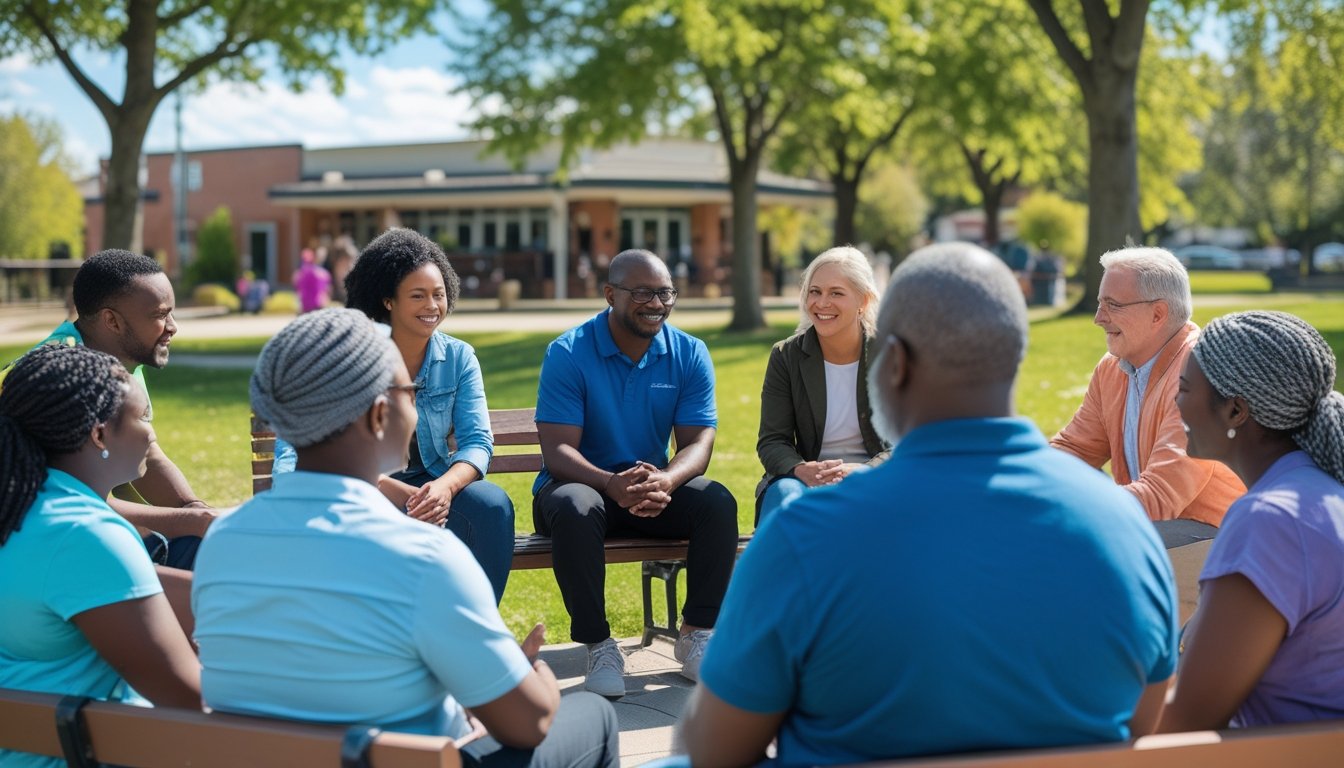Late updated: 29 Jun 2025 09:06
Written by: Ella Thompson
Community Engagement in Addiction Recovery Strategies: Enhancing Support Systems
Community engagement serves as a foundational aspect of achieving sustained success in addiction recovery. By fostering an environment of support and collective involvement, individuals struggling with addiction can find a robust network that aids in breaking the cycle of dependency. This engagement reaches beyond merely attending meetings; it encompasses building meaningful connections within the community that nurtures resilience and empowerment.

In our exploration of community engagement strategies, we'll uncover how initiatives like the Asset Based Community Engagement (ABCE) framework can identify valuable resources and confront barriers faced in the recovery journey. Comprehensive approaches often involve evidence-based programmes tailor-made for local needs to provide an optimised support structure. Our discussions intend to shine a light on these approaches and how they contribute to recovery.
Our goal is to provide insights into the tangible benefits of community involvement in recovery. Building a network of support not only empowers individuals but fosters an enduring commitment to a healthier lifestyle. With the right strategies in place, communities can transform into powerful allies in the battle against addiction, offering pathways to recovery that are accessible and compassionate.
Key Takeaways
- Community support is crucial for sustained addiction recovery.
- Evidence-based programmes enhance community engagement in recovery.
- Building connections fosters resilience and empowerment.
The Role of Community Engagement in Addiction Recovery
Community engagement plays a transformative role in addiction recovery by constructing a network of support, promoting a sense of belonging, and alleviating stigma and isolation. It is these communal interactions that drive the resilience and personal growth essential for long-term recovery.
Building Support Networks
Community engagement provides a foundation for building robust support networks. These networks consist of support groups, recovery communities, and community members who offer vital emotional support. Engaging with these networks allows us to share personal experiences, which can be particularly beneficial for maintaining sobriety and avoiding relapse. The connections we form within these groups create meaningful relationships that can navigate the complexities of recovery. Through structured activities and regular meetings, these networks offer a predictable environment, enhancing stability during recovery. For individuals facing addiction, knowing there are people who understand and care about their journey can be an immense source of strength and motivation.
Fostering a Sense of Belonging
One of the key aspects of community engagement is fostering a sense of belonging. Feeling connected with others can significantly enhance mental health, providing essential emotional security. When individuals are part of a supportive community, they are more likely to feel valued and understood, which can deter negative feelings often associated with addiction. This sense of belonging is crucial in reducing recidivism and promoting long-term commitment to recovery. Communities that offer volunteer opportunities, social events, and collaborative projects contribute to this sense of belonging by facilitating interaction and shared experiences. It's in these empowered groups that we find camaraderie and understanding, which are instrumental in maintaining recovery.
Reducing Stigma and Isolation
Addiction often carries a significant stigma that can lead to isolation. Engaging in community activities helps to challenge these stereotypes by promoting awareness and understanding the complexities of addiction. Through public education and community dialogue, misconceptions about addiction can be addressed, reducing stigma and encouraging acceptance. Being part of a community that validates our experiences can significantly alleviate feelings of loneliness. Active involvement in these communities allows us to forge new connections, combatting the isolation that many in recovery feel. By sharing successes and challenges collectively, we highlight the shared human experience rather than individual struggles, fostering a more inclusive and supportive environment.
Effective Strategies for Enhancing Community Involvement in Recovery

Engaging the community in addiction recovery is about building supportive networks and empowering individuals. Our focus lies on key strategies, including peer support networks, leveraging technology, and family involvement, to create robust support systems for those on the path to sobriety.
Peer Support and Mutual Aid Groups
Peer support and mutual aid groups form the backbone of recovery efforts. Alcoholics Anonymous (AA), Narcotics Anonymous (NA), and SMART Recovery offer platforms where individuals share experiences and gain strength. These 12-step programmes and other recovery support services are integral, providing a sense of belonging. Group meetings foster peer mentorship and create a safe space for open communication.
Being part of these groups helps individuals build recovery capital—resources that support sobriety. Sponsorship and mentorship within these groups also enhance engagement. These connections often lead to shared experiences that reinforce mutual support, making the recovery journey a collective effort rather than a solitary path.
Community-Based Programmes and Initiatives
Community-based programmes and initiatives offer vital support by connecting individuals with local resources. Recovery homes, where individuals can reside in a substance-free environment, play a crucial role. These environments provide structured living arrangements with peer mentors and recovery coaches available to guide individuals.
Community initiatives like public awareness campaigns increase understanding and reduce stigma. Volunteer work and participation in community events can further engage individuals, helping them build important social networks. This engagement fosters a sense of purpose and belonging, crucial for long-term success in recovery.
Leveraging Technology and Online Platforms
Technology and online platforms extend the reach of recovery support services beyond physical barriers. Social media platforms and online forums offer support networks that are accessible anytime, providing a flexible option for many. Digital recovery tools, such as mobile apps, connect individuals with resources and virtual support groups.
These online options complement traditional methods and allow individuals to share experiences and advice in real time. The use of technology ensures that support is always just a click away, which is invaluable for those who might not have immediate access to physical groups or meetings.
Family and Social Network Engagement
Family involvement is crucial in the recovery process. Encouraging open communication and nurturing relationships within family units can provide a significant support network for individuals. Family support often manifests in understanding, patience, and participation in treatment activities and workshops.
Engaging social networks, including friends and community members, helps build social capital—the resources accessible through social connections. Treatment centres often involve families in therapy sessions, highlighting their role in creating a sustainable recovery environment. This network of support is instrumental in rebuilding trust and offering a foundation for lasting change.
Frequently Asked Questions

Engagement with community resources is essential in addiction recovery. By involving peers, families, and local organisations, recovery efforts become more comprehensive and effective.
What are the most effective methods for involving the community in addiction recovery programmes?
We find that community outreach and collaboration with local services are crucial in building effective recovery programmes. Creating partnerships with healthcare providers, social services, and local businesses enhances support networks.
How does peer support contribute to successful addiction recovery outcomes?
Peer support offers a sense of belonging and shared experience. It can motivate individuals to maintain sobriety. Through groups like 12-step programmes, participants gain encouragement and understanding, improving their self-esteem.
What role do community-based organisations play in supporting individuals through addiction recovery?
Community-based organisations provide essential resources such as counselling, housing assistance, and vocational training. They act as a bridge between individuals and the wider network of support, ensuring needs are met efficiently.
How can family involvement be enhanced in the process of addiction recovery?
Involving families in therapy and educational sessions helps them understand addiction and recovery processes. Open communication and support groups for families foster a healthier recovery environment.
What strategies are recommended for engaging youth in community-led addiction recovery initiatives?
Engaging youth requires age-appropriate education and peer-led activities. Creating youth-focused support groups and involving them in developing strategies ensures their voices are heard, making initiatives more appealing and effective.
What are the benefits of integrating holistic approaches in community-engaged addiction recovery?
Incorporating holistic approaches like mindfulness, exercise, and nutrition can improve physical and mental well-being. These methods complement traditional treatments and promote a balanced lifestyle, enhancing recovery outcomes.
